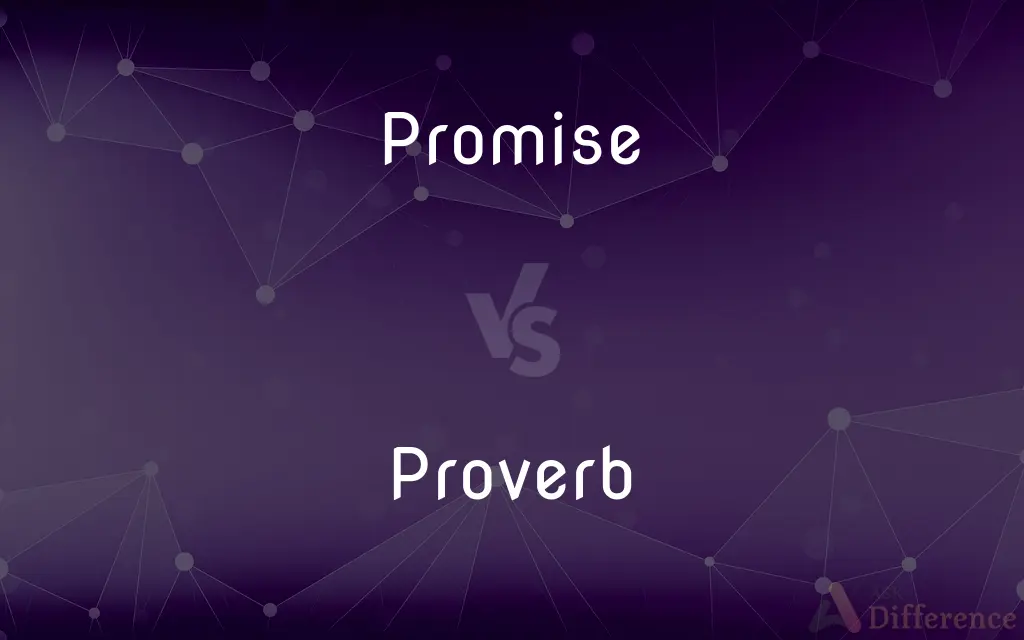Promise vs. Proverb — What's the Difference?
By Fiza Rafique & Maham Liaqat — Updated on March 27, 2024
A promise is a declaration or assurance that one will do something or that a particular thing will happen. A proverb is a short, well-known saying that expresses a general truth or piece of advice.

Difference Between Promise and Proverb
Table of Contents
ADVERTISEMENT
Key Differences
A promise represents a commitment or guarantee made by one person to another, indicating that a specific action will be taken or that a certain event will occur in the future. It's a verbal or written assurance based on trust between individuals. Proverbs, however, are traditional sayings that encapsulate wisdom, moral beliefs, or life's truths, often passed down through generations. They are used to convey common wisdom or cultural beliefs succinctly.
While promises are personal and specific to the situation and individuals involved, requiring accountability from the person who makes the promise, proverbs are impersonal, offering guidance or insights that are universally applicable. A promise is a tool for establishing trust and setting expectations in personal and professional relationships. In contrast, a proverb serves as a cultural and linguistic tool for education, moral instruction, and societal norms.
The breach of a promise can lead to a loss of trust and credibility, impacting personal or professional relationships. On the other hand, proverbs are not bound by such personal commitments or consequences. They remain static pieces of wisdom, their value lying in the applicability of their message rather than in the fulfillment of a commitment.
Promises involve a future action or behavior, directly linked to the promiser's intention and ability to deliver. Proverbs, while they may influence behavior and decision-making, do not commit the speaker to any specific action but rather aim to enlighten or advise the listener or reader generally.
In essence, the key distinction lies in their function and implication: promises are about commitment and action, whereas proverbs are about wisdom and guidance.
ADVERTISEMENT
Comparison Chart
Nature
Personal assurance or commitment
General saying expressing wisdom or advice
Purpose
To guarantee an action or outcome
To impart wisdom, moral lessons, or truths
Accountability
Requires the promiser to fulfill the commitment
No accountability; serves as general guidance
Specificity
Specific to individuals and situations
Universal and applicable to many contexts
Consequence
Breach can damage trust and relationships
No direct consequence; value lies in wisdom shared
Compare with Definitions
Promise
A declaration to do or not do something.
She made a promise to return the book.
Proverb
A short, well-known saying that offers advice or wisdom.
A stitch in time saves nine, is a proverb about the value of fixing a small problem right away.
Promise
An assurance of the quality or longevity of a product or service.
The product comes with a promise of satisfaction.
Proverb
A traditional saying used to illustrate a point or moral lesson.
As the proverb goes, Actions speak louder than words.
Promise
The potential for future success or improvement.
The young athlete showed great promise.
Proverb
A piece of folk wisdom passed down through generations.
Many cultures have a proverb about the importance of unity.
Promise
A commitment to a particular course of action.
He gave his promise to support the project.
Proverb
An expression that succinctly captures a cultural or moral value.
The proverb The early bird catches the worm emphasizes the benefits of acting promptly.
Promise
A vow made between individuals.
They exchanged promises of loyalty.
Proverb
A concise statement expressing a general truth.
The proverb No pain, no gain speaks to the necessity of effort for success.
Promise
A promise is a commitment by someone to do or not do something. As a noun promise means a declaration assuring that one will or will not do something.
Proverb
A proverb (from Latin: proverbium) is a simple and insightful, traditional saying that expresses a perceived truth based on common sense or experience. Proverbs are often metaphorical and use formulaic language.
Promise
A declaration or assurance that one will do something or that a particular thing will happen
I did not keep my promise to go home early
What happened to all those firm promises of support?
Proverb
A short pithy saying in frequent and widespread use that expresses a basic truth or practical precept.
Promise
The quality of potential excellence
He showed great promise even as a junior officer
Proverb
Proverbs (used with a sing. verb) See Table at Bible.
Promise
Assure someone that one will definitely do something or that something will happen
She made him promise that he wouldn't do it again
He promised to forward my mail
He promised her the job
‘I'll bring it straight back,’ she promised
Proverb
A phrase expressing a basic truth which may be applied to common situations.
Promise
Give good grounds for expecting (a particular occurrence)
It promised to be a night that all would remember
Forthcoming concerts promise a feast of music
Proverb
A striking or paradoxical assertion; an obscure saying; an enigma; a parable.
Promise
A declaration assuring that one will or will not do something; a vow.
Proverb
A familiar illustration; a subject of contemptuous reference.
Promise
Something promised.
Proverb
A drama exemplifying a proverb.
Promise
Indication of something favorable to come; expectation
A promise of spring in the air.
Proverb
To write or utter proverbs.
Promise
Indication of future excellence or success
A player of great promise.
Proverb
To name in, or as, a proverb.
Promise
To commit oneself by a promise to do or give; pledge
Left but promised to return.
Proverb
To provide with a proverb.
Promise
To afford a basis for expecting
Thunderclouds that promise rain.
Proverb
An old and common saying; a phrase which is often repeated; especially, a sentence which briefly and forcibly expresses some practical truth, or the result of experience and observation; a maxim; a saw; an adage.
Promise
To make a declaration assuring that something will or will not be done.
Proverb
A striking or paradoxical assertion; an obscure saying; an enigma; a parable.
His disciples said unto him, Lo, now speakest thou plainly, and speakest no proverb.
Promise
To afford a basis for expectation
An enterprise that promises well.
Proverb
A familiar illustration; a subject of contemptuous reference.
Thou shalt become an astonishment, a proverb, and a by word, among all nations.
Promise
(countable) an oath or affirmation; a vow
If I make a promise, I always stick to it;
He broke his promise
Proverb
A drama exemplifying a proverb.
Promise
(countable) A transaction between two persons whereby the first person undertakes in the future to render some service or gift to the second person or devotes something valuable now and here to his use.
Proverb
To name in, or as, a proverb.
Am I not sung and proverbed for a fool ?
Promise
(uncountable) Reason to expect improvement or success; potential.
She shows great promise as an actress.
Proverb
To provide with a proverb.
I am proverbed with a grandsire phrase.
Promise
A placeholder object representing the eventual result of an asynchronous operation.
Proverb
To write or utter proverbs.
Promise
Bestowal or fulfillment of what is promised
Proverb
A condensed but memorable saying embodying some important fact of experience that is taken as true by many people
Promise
(ambitransitive) To commit to (some action or outcome), or to assure (a person) of such commitment; to make an oath or vow.
If you promise not to tell anyone, I will let you have this cake for free.
She promised to never return to this town again.
He promised me a big kiss if I would drive him to the airport.
I can't promise success, but I'll do the best I can.
Promise
(intransitive) To give grounds for expectation, especially of something good.
The clouds promise rain.
Promise
In general, a declaration, written or verbal, made by one person to another, which binds the person who makes it to do, or to forbear to do, a specified act; a declaration which gives to the person to whom it is made a right to expect or to claim the performance or forbearance of a specified act.
For if the inheritance be of the law, it is no more of promise: but God gave it to Abraham by promise.
Promise
An engagement by one person to another, either in words or in writing, but properly not under seal, for the performance or nonperformance of some particular thing. The word promise is used to denote the mere engagement of a person, without regard to the consideration for it, or the corresponding duty of the party to whom it is made.
Promise
That which causes hope, expectation, or assurance; especially, that which affords expectation of future distinction; as, a youth of great promise.
My native country was full of youthful promise.
Promise
Bestowal, fulfillment, or grant of what is promised.
He . . . commanded them that they should not depart from Jerusalem, but wait for the promise of the Father.
Promise
To engage to do, give, make, or to refrain from doing, giving, or making, or the like; to covenant; to engage; as, to promise a visit; to promise a cessation of hostilities; to promise the payment of money.
Promise
To afford reason to expect; to cause hope or assurance of; as, the clouds promise rain.
Promise
To make declaration of or give assurance of, as some benefit to be conferred; to pledge or engage to bestow; as, the proprietors promised large tracts of land; the city promised a reward.
I dare promise myself you will attest the truth of all I have advanced.
Promise
To give assurance by a promise, or binding declaration.
Promise
To afford hopes or expectation; to give ground to expect good; rarely, to give reason to expect evil.
Will not the ladies be afeard of the lion?I fear it, I promise you.
Promise
A verbal commitment by one person to another agreeing to do (or not to do) something in the future
Promise
Grounds for feeling hopeful about the future;
There is little or no promise that he will recover
Promise
Make a promise or commitment
Promise
Promise to undertake or give;
I promise you my best effort
Promise
Make a prediction about; tell in advance;
Call the outcome of an election
Promise
Give grounds for expectations;
The new results were promising
The results promised fame and glory
Common Curiosities
Can a promise be broken?
Yes, a promise can be broken, which may result in loss of trust and credibility between individuals.
Can proverbs change over time?
While the wording of proverbs can evolve, their core messages and wisdom often remain consistent across generations.
What is the primary difference between a promise and a proverb?
The primary difference is that a promise is a commitment or assurance about a specific action or event, while a proverb is a short saying expressing general wisdom or advice.
How do promises affect relationships?
Promises can strengthen relationships through fulfilled commitments but can also harm them if the promises are broken.
Why do people use proverbs?
People use proverbs to impart wisdom, share cultural values, advise, and sometimes to succinctly express a point or opinion in conversation.
Are proverbs relevant in modern times?
Yes, proverbs remain relevant as they encapsulate timeless wisdom and advice that can apply across different eras and cultures.
How do cultures influence proverbs?
Cultures shape proverbs by embedding their values, beliefs, and experiences into these sayings, making each proverb reflective of its cultural background.
Can anyone make a promise?
Yes, anyone can make a promise, but the weight and reliability of the promise depend on the individual's intent and ability to fulfill it.
What happens if a promise is not kept?
If a promise is not kept, it can lead to disappointment, erosion of trust, and potential damage to the relationship between the involved parties.
Is a proverb considered a form of education?
Yes, proverbs can serve as educational tools, conveying moral lessons, societal norms, and cultural values in a concise form.
Share Your Discovery

Previous Comparison
Glory vs. Majesty
Next Comparison
Mumbai vs. BombayAuthor Spotlight
Written by
Fiza RafiqueFiza Rafique is a skilled content writer at AskDifference.com, where she meticulously refines and enhances written pieces. Drawing from her vast editorial expertise, Fiza ensures clarity, accuracy, and precision in every article. Passionate about language, she continually seeks to elevate the quality of content for readers worldwide.
Co-written by
Maham Liaqat















































